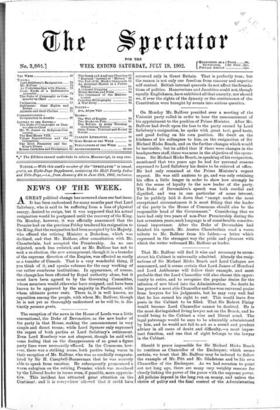On Monday Mr. Balfour presided over a meeting of the
Unionist party called in order to hear the announcement of his appointment to the position of Prime Minister. After Mr. Balfour had dwelt upon the loss to the party caused by Lord Salisbury's resignation, he spoke with great tact, good taste, and good feeling on his own position. He dwelt on the kindness of his colleagues to him, on the resignation of Sir Michael Hicks Beach, and on the further changes which would be inevitable; but he added that if there were changes in the headquarters staff, there was none in the objective of the opera- tions. Sir Michael Hicks Beach, in speaking of his resignation, mentioned- that two years ago he had for personal reasons expressed to Lord Salisbury his desire to be relieved of office. He had only remained at the Prime Minister's urgent request. He was still anxious to go, and was only retaining his office a little longer in order to show how strongly he felt the sense of loyalty to the new leader of the party. The Duke of Devonshire's speech was both cordial and dignified, and was in one particular of some interest, for he publicly laid it down that "except under the most exceptional circumstances it is most fitting that the leader of the party in the House of Commons should' also be the responsible head of the Government." Considering that we have had only two years of non-Peer Premiership during the last seventeen years,-such language is of considerable constitu- tional importance. After the Duke of Devonshire had. finished his speech, Mr. Austen Chamberlain read- a warm tribute to Mr. Balfour from his father,—a letter which expressed in the strongest way the pride and pleasure with which the writer welcomed Mr. Balfour as leader.


































